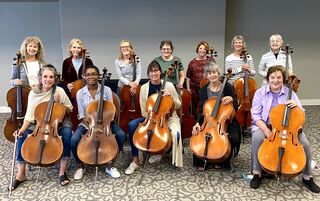Play
The Sounds of Resilience
How amateur cello players formed a community to play and celebrate.
Posted July 15, 2021 Reviewed by Abigail Fagan

As the fog of COVID-induced isolation began to lift, so did the slow return to normalcy, which for amateur musicians meant the search for others to play with. Being one of these folks myself, an email that found my in-box piqued my curiosity. As if by magic, someone was sensing my longing to reconnect with other like-minded would-be cellists. And here was an opportunity.
The wish to reconnect and the joy that it brings actually has a name according to Adam Grant, Ph.D., a psychologist who wrote about “collective effervescence” in the New York Times. According to him “Collective effervescence is the synchrony you feel when you slide into rhythm with strangers … when joie de vivre spreads through a group.” Well-being appears to be the by-product that affects mood and helps to lift situational depression which many experienced during the COVID lockdown.
The grown-up cello camp offered in the email was by a teacher who called herself the “cello guru.” It was scheduled to take place only weeks away in a hotel on the wind-swept beach in Monterey, California. The three-day intensive experience followed close behind the reopening of this particular hotel as it yawned and stirred back to life after 15 months of hibernation. The world was waking up after its long and fretful nap.
After registering, the sheet music came steadily for several days accompanied by soundtracks for listening as we practiced. By the time it all downloaded, I was certain that I’d made a mistake in signing up. Compositions by Bach, Vivaldi, and Dvorak arrived alongside pop tunes that needed to be played, so it seemed, at the speed of light. They seemed complex and challenging, at least by my standards. I reminded myself that my goal was to learn and have fun. But still I wondered if I’d be good enough. Would I fit in? Could I play the pieces well enough to perform publicly without embarrassment? Self-doubts were tempered by the wish to make music with others and gain some skill. In the back of my mind, I repeated a mantra that evolved from my research: novelty, complexity, and problem solving would keep my aging brain humming along and that was good.
In fact, I had written a book on the very subject. In The Vintage Years, I suggested that the slight increase in stress involved in learning something new, like a new piece on a musical instrument or learning a new musical instrument altogether, actually signals the brain to make some new connections and maybe even increase neuronal production. This is incredibly important to maintain optimal brain functioning and help avoid some of the deterioration that, in the past, was erroneously linked to old age.
Keeping neurons firing at rates that will ensure brain flexibility, also known as neuroplasticity, is an important goal that requires effort, just the kind of effort that a post-sixty person is ready and able to give. And playing a musical instrument tends to provide the best stimulation—along with physical exercise and social interactions. In fact, that’s a key reason why I took up the cello in the first place at age 70.
Since the camp was intended for adult students at all levels, it therefore could include me, a late-in-life beginner with 10 years of playing experience under my belt. I knew nothing about the others, who they were or how many. I thought that coming together to play with strangers would be intimidating but could also be exhilarating—and now I know, thanks to Dr. Grant, that it enhances well-being. In fact, our group of 12 bonded over our love of cello despite the disparity in our ages, histories, and professions/occupations. Happily, strangers with a common love don’t remain estranged for long.
The youngest in our group, a 30-year-old professional cellist with a day job in finance, needed a time out from her profession, craved group stimulation, and hoped for a shot in the arm. Her motivation was different from most of us, preparing for an audition and warming up with others while the symphonies on the west coast began to return to playing public concerts. Her musicianship was a hard act to follow, for me, and I dare say, the rest of us.
The range of age in our accidental community was 30-81 with a mean age of 64. But if you leave out the 30-year-old pro, the average age was 67. I was the oldest participant at 81! Other demographics are also worth noting. It turns out that we were a community of near or post-retirement women. Though I’m not sure why this venue attracted women almost exclusively, (one man did sign up but needed to cancel due to illness in his family) I certainly understand why young adults didn’t or couldn’t participate.
Even when youngsters love their musical instruments they are often barraged by myriad choices and interests in their growing-up years, only to generally abandon playing by the end of high school. This was true for several in our camp. Some started on the violin but transitioned as they grew and matured. One camper was offered a partial cello scholarship to attend college but then took a different path and earned a business degree. Like many women, life intervened and she raised four children before returning to her cello decades later.
One camper played the violin as a child but realized it wasn’t her instrument and gave it up at 12. Life happened. When she was in her mid-40s her daughter started cello lessons which this mother sat in on. It wasn’t the daughter who practiced. You guessed it. Mother progressed and found her instrument. A scientist, as she approaches retirement, she looks forward to devoting herself to more cello.
A middle-aged social worker in our group played cello as a young child until age 12. Then the years passed. She didn’t pick up her instrument again until three years ago, but she did haul it around with her for years and years untouched. Another woman who just retired from a career in pediatric health started playing around age 60 for the first time. Her motivation was not entirely musical. She wished to outrun Alzheimer’s disease which has stricken several family members, including her mother and sister. Though she also has the markers, she shows no signs of the disease. She did her research, though, and realized that learning how to play a musical instrument was the kind of activity that would help maintain her cognitive acuity and flexibility. Science validates her decision. Post-mortem studies of individuals with no apparent symptoms while they were alive, often had brains riddled with Alzheimer's tangles and plaques. Cognitive stimulation is indeed credited with helping to counter the deterioration that was happening in their brains, but happily did not translate into their daily lives.
In our very first practice, our “cello guru” announced that it was good to push ourselves to play and practice in ways that seemed impossible, for example, scales with unusual bowing or counting that quickly shifted from fast to slow and back again. She said that it would be “good to stave off Alzheimer’s.” Her advice resonated with my own observations and my writing about the aging brain. Shaking up how you do what you do, backwards, upside down, using your hands or holding your cello in new ways, is excellent tonic to stimulate cognitive functioning. While the 30-year-old in our midst didn’t require that tonic, the rest of us could unquestionably benefit.
By day three, we weren’t seamless nor ready for a concert at Lincoln Center, but we did come together as a cohesive cello ensemble. What a high! Remember, only three days ago we were a bunch of women shaking off our post-COVID inertia, emerging from our isolated cocoons, and seeking some comradery from other like-minded music-loving folks with varying degrees of experience. The common equation among the dozen of us was some history that included music, whether late-in-life beginners, or musicians emerging from their middle years to finally find some space to re-visit an instrument that gave them pleasure once-upon-a-time. And it was a great workout for our brains.




